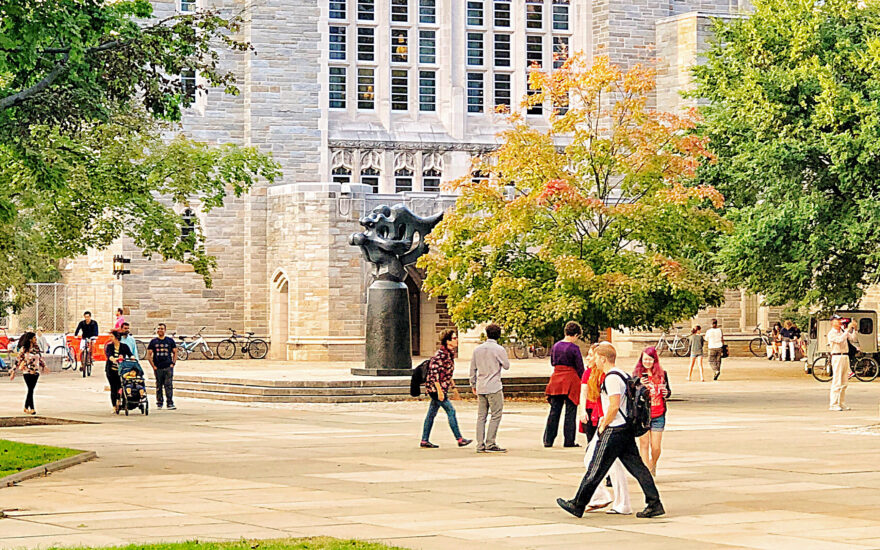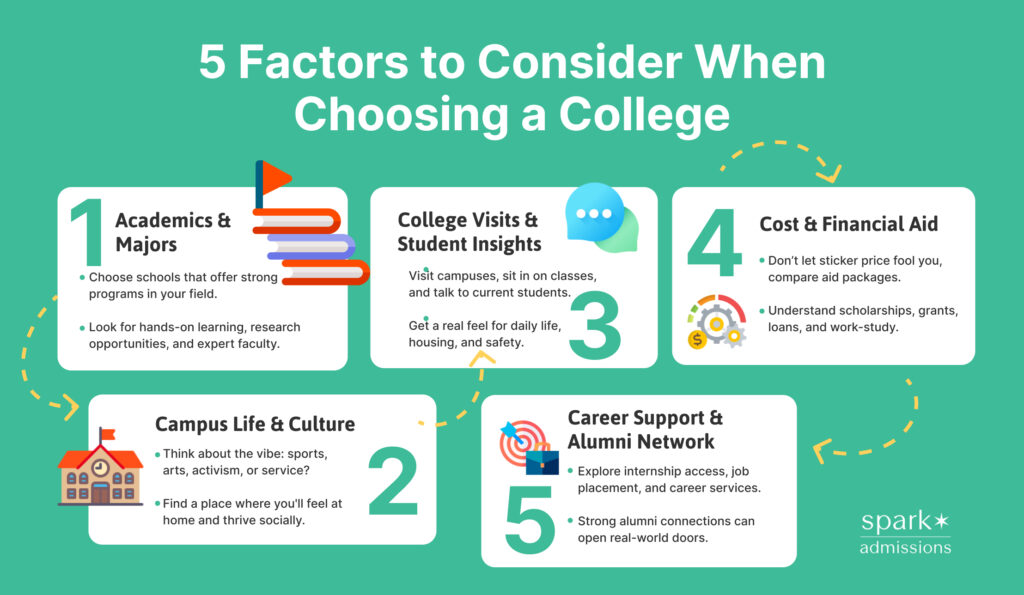- Blog
- > Applications and Essays
How to Choose a College and Find the Best Fit for You
- Dr. Rachel Rubin
- | April 8, 2025

Choosing a college is one of the most important decisions a student will make. The right college can shape academic and career opportunities, personal growth, and overall life experiences. With thousands of colleges and universities available, the college search process can feel overwhelming.
By considering key factors like academics, campus life, financial aid, and career opportunities, prospective students can make informed choices that align with their goals and interests.

Defining Your Priorities
Before diving into specific colleges, students should reflect on their priorities. Important factors to consider include academic interests, campus culture, location, and extracurricular activities. Some students may prefer larger schools with extensive research opportunities, while others may be drawn to smaller, private colleges that offer more personalized attention. Determining what matters most will help narrow the college list and make choosing a college a more intentional process.
Academics and Programs
One of the most important factors when choosing a college is the quality of its academic programs. Students should research specific majors and specialized programs offered by different universities. Certain majors, such as engineering, business, or pre-med, may require access to cutting-edge facilities, experienced faculty, and internship opportunities. Additionally, students interested in research opportunities should explore universities that emphasize hands-on learning and faculty mentorship.
Campus Culture and Student Life
A college experience extends beyond academics. Campus culture plays a significant role in a student’s overall happiness and success. School spirit, student organizations, and campus traditions contribute to the social environment of a college. Prospective students should consider what type of campus life suits them best. Some may thrive in schools with vibrant athletic programs and strong school spirit, while others may seek out colleges with a focus on arts, activism, or community service.
College Visits and Talking to Current Students
College visits provide valuable insight into a school’s atmosphere. Walking around a college campus, sitting in on a class, and speaking with current students can help prospective students get a feel for daily life. During visits, it’s useful to ask about extracurricular activities, housing options, and campus safety. A school counselor can also provide guidance on making the most of college visits and comparing different college campuses.
Cost and Financial Aid Package Considerations
College costs are a major concern for most students and their families. Tuition costs vary widely between public and private colleges, and the sticker price does not always reflect the actual amount students will pay. Many colleges offer scholarships and need-based financial aid packages to help offset costs. Understanding the financial aid process, including grants, loans, and work-study programs, can make higher education more accessible. Before making a final decision, students should compare financial aid packages and consider long-term affordability.
Career Opportunities and Alumni Network
A college degree should provide valuable career opportunities after graduation. When researching schools, students should look at job placement rates, internship programs, and career services. Universities with strong alumni networks can provide mentorship and job connections. Additionally, some colleges have partnerships with leading companies that help students gain real-world experience through internships and cooperative education programs.

Building a Balanced College List
A well-balanced college list includes a mix of reach schools, target schools, and safety schools. Reach colleges are more competitive, while target schools align with a student’s academic profile. Safety schools have higher acceptance rates and provide a backup option.
Consulting a school counselor or college admissions consultant can help students refine their initial list and develop realistic expectations about admission chances. Determining the most important factor in your college experience is a good place to start.
Considering Campus Size and Location
The size and location of a college can greatly impact a student’s college experience. Some students prefer the close-knit feel of small private colleges and the student body, while others thrive in larger schools with more diverse opportunities. Additionally, location plays a role in personal comfort and career prospects when deciding where to attend. Some students want to stay close to home, while others seek adventure in a new city or region. Climate, urban vs. rural settings, and proximity to internship opportunities are also important factors to help you decide which university makes sense for you.
Social Life
Extracurricular activities enhance the overall college experience. Students should explore clubs, sports teams, music programs, and volunteer opportunities that align with their interests. Being involved in campus activities helps students develop leadership skills, build friendships, and stay engaged outside the classroom. Whether participating in student government, theater productions, or academic clubs, extracurricular involvement can make college more fulfilling.
Pros and Cons List: Summarizing Your Research
Once students have researched different colleges, creating a pros and cons list can help them choose a college that aligns with their academic and personal goals. Evaluating key factors makes it easier to weigh the benefits and drawbacks of each option.
When making a pros and cons list, consider including:
- Academic programs – Strength and reputation of majors, faculty support, and availability of research opportunities.
- Campus life – Social environment, student diversity, housing options, and extracurricular activities.
- Financial aid and tuition – Cost of attendance, availability of scholarships, and financial aid packages. A school with higher tuition may offer generous aid, while a lower-cost college might have fewer resources.
- Extracurricular activities – Clubs, sports, study abroad programs, and internship opportunities that contribute to personal and professional growth.
- Class sizes and faculty access – Student-to-professor ratio and availability of academic support services.
- Location – Proximity to home, urban vs. rural setting, climate, and local job market opportunities.
- Career services – Job placement rates, alumni network, and internship connections that help students transition into their careers.
- Course flexibility – Honors programs, AP course credit, dual enrollment options, and the ability to double major.
- Diverse opportunities – Some schools provide a wide range of academic and extracurricular activities, while others may specialize in certain fields. Trade-offs between program depth, social environment, and career readiness should be carefully weighed.
A well-structured list can help students and parents compare options and decide on the best fit. While rankings and prestige can be appealing, the best college is the one that aligns with a student’s academic interests, financial needs, and personal growth opportunities. Having a balanced list of reach schools, match schools, and safety schools increases the chances of finding the right overall fit.
Getting the Most Out of College Campus Visits
Visiting campuses is a crucial step in deciding where to apply. A school’s website and brochures can only tell you so much—experiencing the environment firsthand gives a clearer picture of student life, academic opportunities, and campus culture.
When visiting, take note of class sizes, dorm quality, dining options, and extracurricular activities. Talking to current students, attending an admissions session, and exploring the surrounding area can help you determine if a college is the right fit. College deans and faculty members can also provide insight into academic programs and research opportunities, making them valuable resources during your visit.
Read More: The Spark Admissions Guide to Visiting Colleges
Making the Final Decision
After thorough research and campus visits, students must weigh all factors and decide which college is the right fit. Comparing academic programs, financial aid packages, campus culture, and personal goals can help make the decision clearer. Discussing options with parents, mentors, and school counselors can also provide additional perspective. Ultimately, choosing a college should feel like an exciting step toward the next four years of education and personal growth.
Navigating the college search process can be complex, but expert guidance makes it easier. Spark Admissions has the highest college admissions success rate in the country. Contact us to learn more about our admissions consulting services.


